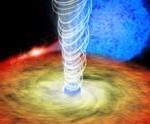Category Science & Technology
Jets from neutron star rival those made by black holes
A team of astronomers led by a UW–Madison scientist has found that neutron stars produce jets of energy and matter that rival those produced by black holes.
Major bioenergy initiative takes flight in Midwest
A consortium of universities, U.S. Department of Energy (DOE) national laboratories and businesses led by the University of Wisconsin–Madison to explore the vast potential of bioenergy was awarded one of three major new DOE bioenergy research centers, it was announced today (June 26).
Brain scans show meditation changes minds, increases attention
For hundreds of years, Tibetan monks and other religious people have used meditation to calm the mind and improve concentration. This week, a new study shows exactly how one common type of meditation affects the brain.
Behavioral scientist recalls campus climate of the ’50s
Students of color are not much different today than they were 50 years ago, behavioral neuroscientist Leslie H. Hicks told a group of PEOPLE undergraduates during an informal question-and-answer session about college life.
UW-Madison employee shines light on solar power, energy conservation
A UW–Madison employee has demonstrated his commitment to the environment by switching to solar power for most of his energy needs.
Professor recognized for work on climate change and insurance
Dan Anderson, a University of Wisconsin–Madison business professor, has won a $10,000 stipend for his paper on risk management as it relates to global warming and climate change.
Engineers develop higher-energy liquid-transportation fuel from sugar
Plants absorb carbon dioxide from the air and combine it with water molecules and sunshine to make carbohydrate or sugar. Variations on this process provide fuel for all of life on Earth.
Concrete canoe team wins fifth straight national title
Racing and exhibiting a 20-foot, 176-pound boat named Descendent, the University of Wisconsin–Madison Concrete Canoe Team did more than just buck the laws of physics this weekend: Despite stiff competition, the team earned its fifth consecutive national title at the American Society of Civil Engineers 20th annual National Concrete Canoe Competition, held June 14 through 16.
Forum to explore sports, race, gender
In the wake of the Don Imus-Rutgers women's basketball controversy, this year's University Summer Forum will explore the culture of sport and its wide-ranging effects on society through race, gender and corporate sponsorship.
Training grants a boon to research, scientists
David Beebe is living proof of the value of training grants such as the Biotechnology Training Program.
Middle-schoolers to give Madison neighborhoods a virtual overhaul
Some Madison middle school students will have a pretty impressive subject for their "What I did on my summer vacation" essays - developing their own plan for making over the capital city's most famous street and some of its key neighborhoods.
Students cross border to study environmental justice
This month, seven students will learn about and try to remedy some of the major environmental injustices surrounding the Mexican-U.S. border area through a University of Wisconsin–Madison summer course titled " Crossing Borders: Environmental Justice at the Mexico/U.S. Border."
Research probes seniors’ plans for end-of-life care
A new UW–Madison study offers insight into a critical part of end-of-life planning.
Lakeshore preserve Web site wins ‘Best of 2007’ award
The interactive Web site for the University of Wisconsin–Madison Lakeshore Nature Preserve has garnered another national award.
UW-Madison welcomes students for summer graduate research experience
This summer, the University of Wisconsin–Madison will host 100 of the brightest undergraduate students in their fields from around the country to do graduate-level research with faculty members.
With a big assist from NASA, UW-Madison launches astrobiology push
With the help of a $6.5 million grant from NASA, Wisconsin researchers will join the hunt for extraterrestrial life and early life on Earth by developing techniques and instruments to read the chemical signatures living organisms leave in rocks and minerals.
Mutant parasites, unable to infect hosts, highlight virulence genes
With a single approach, microbiologists at the University of Wisconsin–Madison have identified dozens of clues to how human parasites may infect their hosts.
Freshman engineers seize the wind…and a new opportunity
Inspired to reinvigorate his teaching after a yearlong sabbatical, electrical and computer engineering professor Giri Venkataramanan decided to try an experiment. During spring semester 2007, he challenged the freshman in his introductory engineering class to build a functioning wind turbine from scratch.










